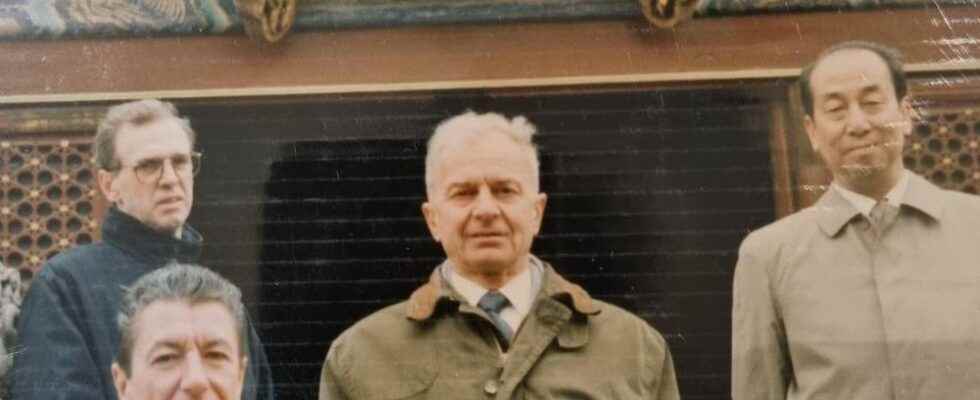Two spies behind bars. At the end of 2017, Henri M. and Pierre-Marie H., retired from the DGSE, were arrested a few days apart, along with their wives. On their bank accounts, the investigators found traces of suspicious transfers of 160,000 euros and 200,000 euros. It is that, for several years, these two sexagenarians met very discreetly with Chinese intelligence agents, the Guoanbu.
Henri M. was head of the French secret service in China between 1996 and 1998. His sentimental affair with “Justine”, an embassy interpreter, in reality linked to the “services”, earned him a “blue flight “, that is to say in emergency repatriation in mainland France. Immediately fired from the DGSE, he was recruited by Chinese spies and convinced Pierre-Marie H., one of his former colleagues, to betray in turn. Assigned to the archives service, the latter provided the Guoanbu with classified documents. In July 2020, the two defectors were sentenced to eight and twelve years in prison for “intelligence with a foreign power”.
The episode, told at length in Betrayals at the DGSE (Stock), a fascinating investigation by journalists Antoine Izambard and Franck Renaud, illustrates the activism of Chinese intelligence against us and their mastery of the codes for recruiting spies. Compromise by seduction, the use of the probably injured ego of two disgraced agents, greed with the payment of handsome sums: almost all the traditional “levers” have been activated. “There is only the ideology that they do not use too much because they know that it has little chance of convincing. For the rest, when they want to recruit a Frenchman, the Chinese can be very aggressive. They are ready to pay the price”, underlines Olivier Mas, ex-agent of the DGSE.
For several years, the Chinese services have been massively contacting, under covers and in English, young, freshly retired agents on the LinkedIn social network. Invitations to come and give a conference in China follow, then a first proposal for payment. “The Chinese are above all offensive in China, they rarely leave their territory, which limits their method but also their strength: it is difficult to fault them”, continues Olivier Mas. Under these conditions, it is difficult to carry out effective counterintelligence actions. “Except in Africa, where the Chinese sometimes reveal themselves a little more,” slips a source in intelligence.
A vast recruitment plan for foreign researchers
The modus operandi is now known to business leaders: on a trip to China, they are offered large sums of money or are put in contact with attractive young women. At the end of the 2000s, confidential documents were found in the belongings of the new Chinese companion of a senior executive of the Airbus group, a former ministerial adviser under François Mitterrand. Almost fifteen years later, have the bosses learned the lesson? Jean-Maurice Ripert, ambassador to China between 2017 and 2019, replies in the negative: “I am amazed by the number of heads of cultural institutions, universities or business leaders who are indifferent to security issues with regard to from China.” Via the Third Department of the People’s Liberation Army, which specializes in computer attacks, the Chinese government has on several occasions been able to gain access to poorly protected industrial secrets.
April 1997, in front of one of the halls of the Temple of Heaven, in Beijing. From left to right: Henri M. (colonel of the Train army, chief of post in Beijing since 1996), Guy Azais, (diplomat, director of strategy), Jacques Dewatre (director of the DGSE), a “guide “Unidentified Chinese.
DR
In French universities, the Guoanbu also uses Chinese students, enrolled through inter-establishment partnerships. They bully them into stealing scientific secrets. “These students know that things can happen to their families if they refuse,” said a senior official who worked on the Chinese file. In 2018, a doctoral student at the University of Metz entered research laboratories several times. She was fired. It also happens that the diaspora settled in France is used: at the end of the 1990s, a DGSE analyst, of Chinese origin, was confused with classified documents at home. Some concerned China, a file on which she was not working.
However, their mode of action is perhaps the most effective is legal: in 2008, China launched the “1000 talents” program, a vast plan to recruit foreign researchers in strategic fields. To attract these sizes, the government offers them extremely high salaries, “up to 10 times what they earn in France”, slips a source in intelligence. The modus operandi is very similar to that of the reversal of the spies: the government offers a first conference in China to its target. “The trip is in business class and a driver is waiting for you at the airport”, describes a diplomat. The idea is to impress. During a second trip, emissaries make an offer to the researcher, often staggering.
And it works. A note from the Treasury Department of November 4, 2019 estimated that “certain sections of Chinese research have been almost entirely “imported” from abroad via this program”. According to the Australian Strategic Policy Institute, which specializes in the study of soft-power Chinese, a thousand French experts could have been recruited in this way.
